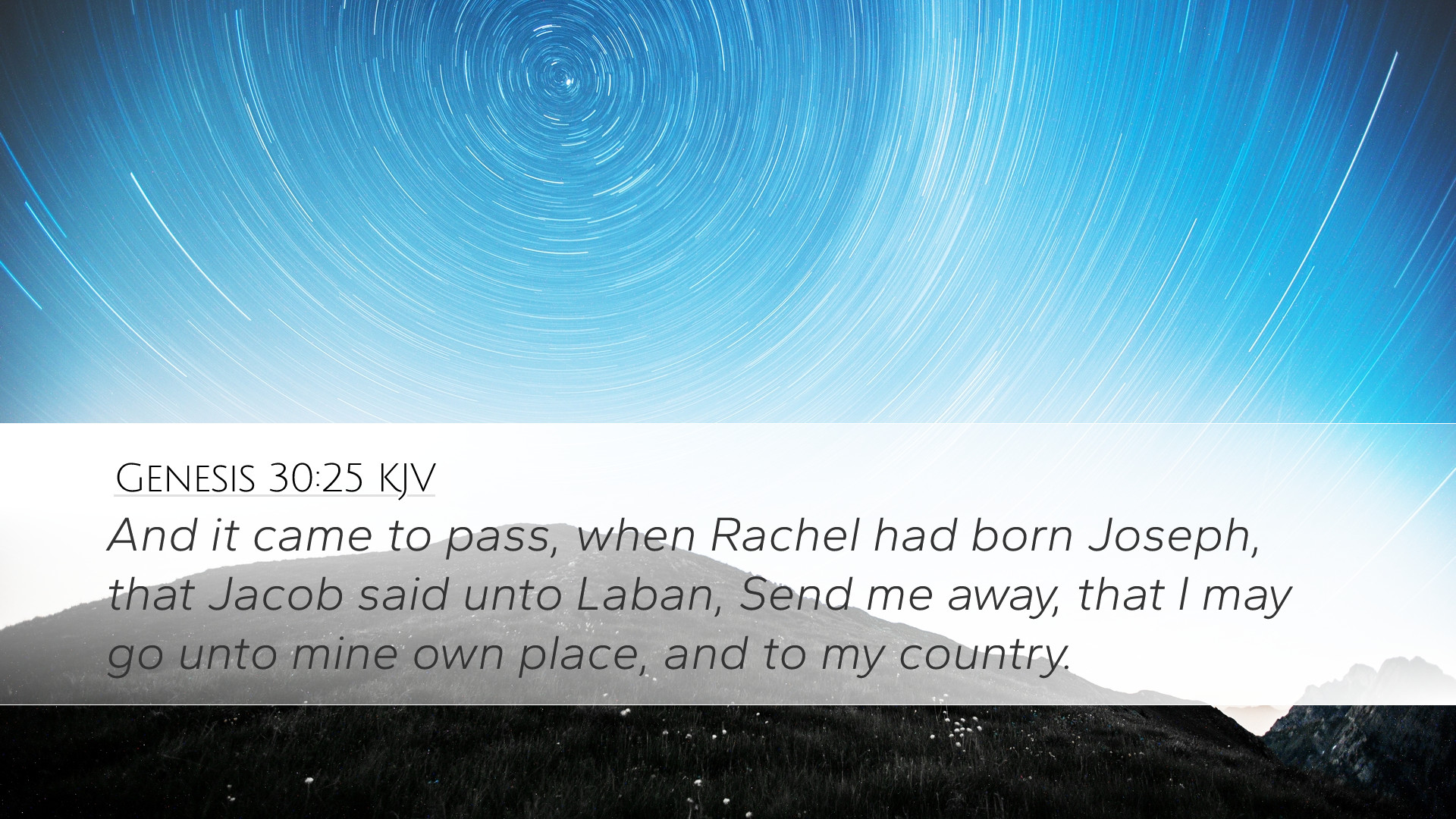Commentary on Genesis 30:25
Verse Reference: Genesis 30:25 - "And it came to pass, when Rachel had borne Joseph, that Jacob said unto Laban, Send me away, that I may go unto mine own place, and to my country."
Introduction
This verse marks a pivotal transition in the narrative of Jacob’s life within the household of Laban. After years of service and the complexities of family relationships, particularly surrounding the births of his children, Jacob's desire to return to his homeland becomes pronounced. This commentary seeks to unpack the theological and practical implications of this moment, drawing insights from well-respected public domain scholars.
The Historical Context
Jacob, after fleeing from Esau, had lived with Laban for over twenty years. During this time, he had married Leah and Rachel, and had children with both women and their handmaids. Laban’s household is characterized by favoritism, rivalry, and divine blessing, which culminate with the birth of Joseph, Rachel's first son.
The Significance of Joseph's Birth
Matthew Henry emphasizes that Joseph represents a turning point for Jacob. As the son of Rachel, who was loved by Jacob, Joseph’s birth signifies not only personal joy for Jacob but also God’s providence. With Joseph’s arrival, Rachel’s long-standing barrenness is overturned, and this moment is laden with spiritual significance as the fulfillment of God’s promises to Jacob become increasingly apparent.
Rachel's Joy and Jacob's Response
Albert Barnes notes the emotional weight of this verse, indicating that Jacob’s urgent desire to leave Laban stems from the culmination of his time spent in the household under conflicting loyalties and labor. The joy of having his beloved son Joseph instigates a longing for his homeland, a desire for autonomy, and a recognition of the familial tensions that have persisted during his prolonged servitude.
Theological Implications
This verse serves as a profound illustration of God’s sovereignty and the unfolding of His covenant promises. Adam Clarke points out that Jacob’s longing to return to Canaan can be viewed as a manifestation of his recognition of divine call, indicative of his commitment to the land promised to his forefathers. Jacob acknowledges that his sojourn in Mesopotamia has reached its critical juncture.
- Divine Timing: Jacob’s request reflects God's divine timing in his life and His overarching plan for the nation of Israel.
- Human Initiative: While God’s plans prevail, Jacob’s initiative to leave showcases the interplay of divine providence and human decision.
- Fulfillment of Promises: Jacob's actions suggest a deep-seated trust in God's promises, demonstrating that God’s faithfulness encourages followers to embrace their destinies.
Lessons for Pastors and Theologians
This verse presents invaluable lessons for spiritual leaders:
- Endurance in Trials: Jacob's trials under Laban are emblematic of spiritual growth through adversity, an essential theme for pastoral teaching.
- Faithful Obedience: Jacob's departure illustrates the importance of adhering to divine direction, a crucial reminder for congregational guidance.
- Seeking God's Will: In times of decision-making, referring to the principles from Jacob's experience can help individuals discern God’s will in their lives.
Conclusion
Genesis 30:25 stands as a profound milestone in Jacob's journey of faith and obedience to God. Through the reflections provided by Matthew Henry, Albert Barnes, and Adam Clarke, readers are offered rich insights into the emotional, social, and spiritual dynamics at play within this narrative. Jacob's yearning to return home, ignited by the joyous birth of Joseph, serves as a poignant reminder of the journey of faith, the fulfillment of God's promises, and the continuous interplay of divine providence and human action throughout Scripture.


